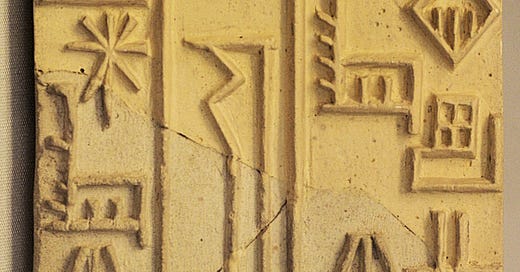I have been studying (not very enthusiastically, but I have been studying!) the Hebrew language so as better to understand the scriptures. One thing that has struck me is that a lot of items in the scriptures are the same words, but have a very different meaning. One example is the phrase "son of man". It has several different meanings: a regular person, a prophet, or the Savior / Son of God. It appears that "adam" is similar - it can mean a regular person, or a very high / spiritual / righteous person.
A perplexing example of this is the words for God. "el" means "God" or "god". Often, the word "elohim" is written. Sometimes it means multiple gods or Gods, and sometimes it just means "God" Himself, as in "the God of Gods", or "the Most High God", the supreme of all of them and therefore written as multiple.
This explanation doesn't make sense to me since there would need to be more than just context to get the real meaning of what they were trying to say. I know that words have migrated meanings over the centuries; a great example of that is the word "goy / goyim" for gentiles. It really means something the opposite today (in the world's view of its meaning) of what it originally meant in the scriptures.
Well, the other day while I was mowing my lawn I was prompted to listen to a discussion between two atheists about the etymology of biblical Hebrew. One of the discussion items was the way that the ancient Akkadians and Sumerians wrote the word for "God". Their supreme God was the God of the Sky / Heavens. In order to designate that the entity one was speaking of was a god vs just a normal ocean or fire or earth thingy, they would write the symbol for the heavens before the entity. It is called a logogram. So if you are talking about the god or goddess of the stars, you would write the symbol for the sky / heavens (dingir) and then the symbol for the stars. This would mean "I am speaking of the god or goddess of the stars, not the stars themselves."
dingir
When a Sumerian or Akkadian was writing "the supreme God of the Sky / Heavens", it would be two copies of the dingir symbol. They wouldn't see it as "dingir dingir". In fact, it had a different pronunciation when speaking of the sky or heavens - An. So, the two together would read "dingir An", or "the Supreme God An".
Imagine, though, if you were a later person who was reading about An, and you were only partially familiar with Sumerian or Akkadian. It would look to you like someone was writing "gods", or "Gods".
This seems significant to me, and I am sure that it is one of the things I have been suspicious of. I believe this is what the issue is with our understanding of the Biblical Hebrew for the word "elohim" when it is speaking specifically about God Himself [or Eloah, probably the dual form of El]. It is not likely to be intended to mean "God of Gods". It is likely that ancient Hebrew originally (before the Babylonian alphabet) had a symbol for "god / God" that was written twice when speaking specifically about God; and later readers and scribes after an apostasy, say at Josiah's day, didn't really understand the correct meaning of when it was speaking about the Council of Gods, etc., vs God Himself, written as "the God Elohim".
I also believe there were early textual / alphabetical markers that distinguished between regular people, sinful people, righteous people, etc., but that those markers were lost in apostasy and alphabetical changes.
I know this is deep in the weeds, but it was quite a revelatory experience for me.
Here's another example: In Hebrew, one of the words for God is "el shaddai". This means "God of Sustenance". Shaddai can mean "spirit" or "sustenance from a mother". Without the "el" in front of it, you don't know that they are speaking about God. It would be confusing to those whose ancestors had apostatized when they were seeking to reconnect with God (and I think it is specifically visible in the Book of Mormon: El Shaddai also could be translated literally as "the Great Spirit" or "the Spirit of overwhelming strength", which is how the Lamanites, who had drifted into apostasy, thought of God). It matches the same pattern as the Sumerian and Akkadian - the symbol for God and then the symbol of the specific characteristic of God that you are speaking about.
Here is an ancient Sumerian text, with "God God" / "dingir An" in the top right-hand corner:
I have wondered why this would come to me, and how the ancient Sumerians and Akkadians connected to the Hebrew. In my unlearned mind, I can imagine how a neighboring and older civilization could have influenced the young upstarts in Israel, but that doesn't mean it happened that way.
Well, guess what language Abraham likely spoke! It was either Sumerian or Akkadian, as both of those languages were dominant in the areas that Abraham is likely to have come from at that time.
So, this is a very relevant concept for the later Israelites.





